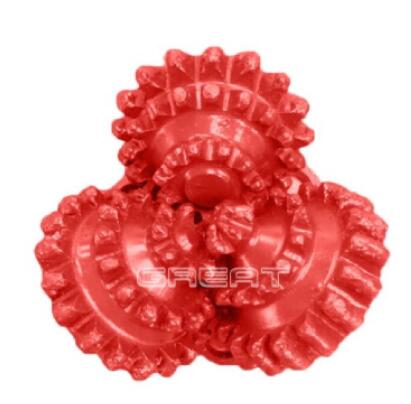A mill tooth bit, also known as a milled-tooth bit, is a type of drill bit used for drilling through various types of hard and abrasive rock formations. Mill tooth bits have been used for many years in the oil and gas industry, mining, and water well drilling.
Mill tooth bits consist of a rotating steel body with a series of hardened steel teeth or milled-tooth inserts embedded in the bit's cone. These teeth are designed to scrape and grind through rock formations, creating a borehole.
The size and shape of the teeth vary depending on the type of rock formation being drilled. For example, for soft formations like limestone, the teeth are usually rounded and widely spaced to prevent clogging. Conversely, for hard formations like sandstone, the teeth are usually sharp and closely spaced to help grind through the rock.

There are several advantages of using mill tooth bits:
Cost-effective: Mill tooth bits are typically less expensive than other types of drill bits, making them an attractive option for drilling operations on a budget.
Versatile: Mill tooth bits can be used to drill through a wide range of rock formations, from soft to hard, making them a versatile option.
High drilling rate: Mill tooth bits are designed to drill quickly through rock formations, which can help reduce drilling time and costs.
Customizable: Mill tooth bits can be customized with different types of teeth and cone angles to optimize drilling performance for specific rock formations.
Durable: Mill tooth bits are made from high-quality steel and hardened teeth, which can help extend their lifespan and reduce the need for frequent replacements.
However, there are also some disadvantages of using mill tooth bits:
Limited durability: Although mill tooth bits are durable, they can wear down quickly if used in very hard formations or if used improperly, which can lead to increased drilling costs.
Prone to vibration: Mill tooth bits can generate a lot of vibration while drilling, which can cause damage to the drill string and other drilling equipment.
Limited performance in certain formations: Mill tooth bits may not be effective for drilling through certain types of formations, such as abrasive or highly fractured rock.
In conclusion, mill tooth bits are a cost-effective and versatile option for drilling through a wide range of rock formations. However, they do have some limitations, and the type of bit chosen should be carefully considered based on the specific drilling conditions and formation being drilled.
Copyright:@2020-2021
Comments Please sign in or sign up to post.
0
0 of 500 characters used